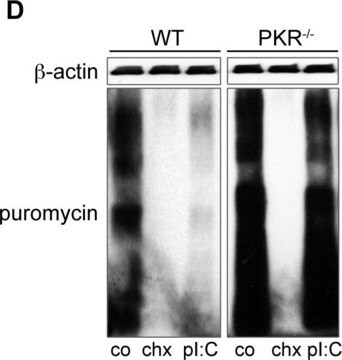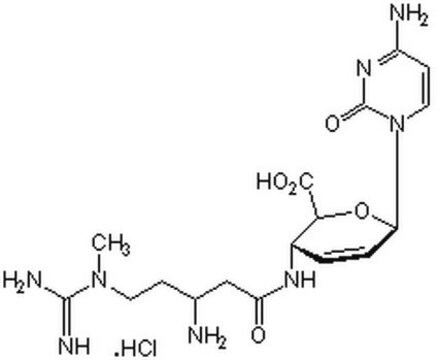P9620
Puromycin dihydrochloride
Ready Made Solution, from Streptomyces alboniger, 10 mg/mL in H2O, suitable for cell culture
Synonym(s):
3′-(L-α-Amino-p-methoxyhydrocinnamamido)-3′-deoxy-N,N-dimethyladenosine dihydrochloride, Stylomycin dihydrochloride
About This Item
Recommended Products
biological source
Streptomyces alboniger
Quality Level
type
for cell culture
Assay
>98% (HPLC)
form
solution
storage condition
(Store in cool place. Keep container tightly closed in a dry and well -ventilated place. )
concentration
10 mg/mL in H2O
technique(s)
cell culture | mammalian: suitable
color
colorless to yellow
solubility
H2O: soluble 10 mg/mL
antibiotic activity spectrum
Gram-positive bacteria
neoplastics
parasites
Mode of action
protein synthesis | interferes
shipped in
wet ice
storage temp.
−20°C
SMILES string
Cl.Cl.COc1ccc(C[C@H](N)C(=O)N[C@H]2[C@@H](O)[C@@H](O[C@@H]2CO)n3cnc4c(ncnc34)N(C)C)cc1
InChI
1S/C22H29N7O5.2ClH/c1-28(2)19-17-20(25-10-24-19)29(11-26-17)22-18(31)16(15(9-30)34-22)27-21(32)14(23)8-12-4-6-13(33-3)7-5-12;;/h4-7,10-11,14-16,18,22,30-31H,8-9,23H2,1-3H3,(H,27,32);2*1H/t14-,15+,16+,18+,22+;;/m0../s1
InChI key
MKSVFGKWZLUTTO-FZFAUISWSA-N
General description
Puromycin′s structural similarity to the amino acid-bearing end of tRNA allows it to enter the ribosome during protein synthesis, bind to the nascent polypeptide chain, and halt chain elongation. Widely used in cell culture, puromycin serves as a selective agent for cells that have been transformed with a gene conferring resistance to puromycin.
Application
Biochem/physiol Actions
Mode of Resistance: Puromycin acetyltransferase is an effective resistance gene.
Antimicrobial Spectrum: This product is active against gram-positive microorganisms, less active against acid-fast bacilli and more weakly active against gram-negative microorganisms. Puromycin can prevent growth of bacteria, protozoa, algae and mammalian cells and acts quickly, killing 99% of cells within 2 days.
Features and Benefits
- High-quality antibiotic suitable for multiple research applications
- Antibiotic and protein synthesis inhibitor
- Effective against prokaryotic and eukaryotic cells
- Inhibits protein synthesis by interfering with RNA function
- Commonly used as a selective agent in cell biology research
Preparation Note
Other Notes
comparable product
Storage Class Code
10 - Combustible liquids
WGK
WGK 2
Flash Point(F)
Not applicable
Flash Point(C)
Not applicable
Personal Protective Equipment
Certificates of Analysis (COA)
Search for Certificates of Analysis (COA) by entering the products Lot/Batch Number. Lot and Batch Numbers can be found on a product’s label following the words ‘Lot’ or ‘Batch’.
Already Own This Product?
Find documentation for the products that you have recently purchased in the Document Library.
Customers Also Viewed
Articles
The introduction of small interfering RNAs (siRNAs) into cultured cells provides a fast and efficient means of knocking down gene expression and has allowed siRNAs to quickly become a ubiquitous tool in molecular biology.
MISSION® Target ID Library for Human miRNA Target Identification and Discovery;
Introduction of small interfering RNAs (siRNAs) into cultured cells provides a fast and efficient means of knocking down gene expression and has allowed siRNAs to quickly become a ubiquitous tool in molecular biology.
Our lentiviral vector systems are developed with enhanced safety features. Numerous precautions are in place in the design of our lentiviruses to prevent replication. Good handling practices are a must.
Protocols
Experimentally determine the appropriate antibiotic concentration for selecting stable cell lines. This titration protocol can determine the lowest concentration of puromycin needed to efficiently select transduced cells.
This detailed procedure allows you to transduce Mouse Embryonic Fibroblasts (MEF) using MISSION ExpressMag Super Magnetic Kit.
You are not alone designing successful CRISPR, RNAi, and ORF experiments. We were the first company to commercially offer lentivirus versions of targeted genome modification technologies and has the expertise and commitment to support new generations of scientists.
FACS (Fluorescence-Activated Cell Sorting) provides a method for sorting a mixed population of cells into two or more groups, one cell at a time, based on the specific light scattering and fluorescence of each cell. This method provides fast, objective, and quantitative recording of fluorescent signals from individual cells.
Our team of scientists has experience in all areas of research including Life Science, Material Science, Chemical Synthesis, Chromatography, Analytical and many others.
Contact Technical Service










